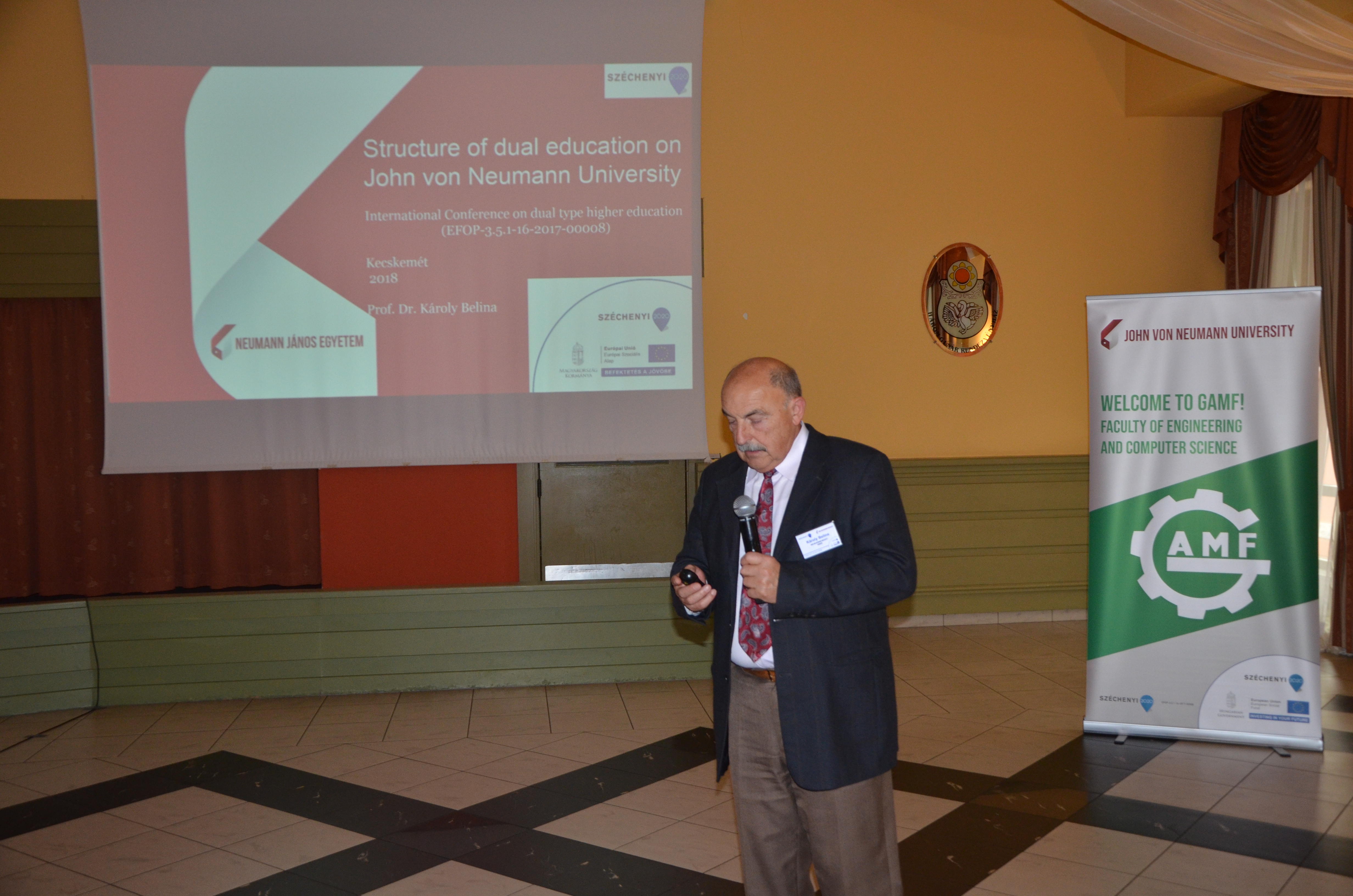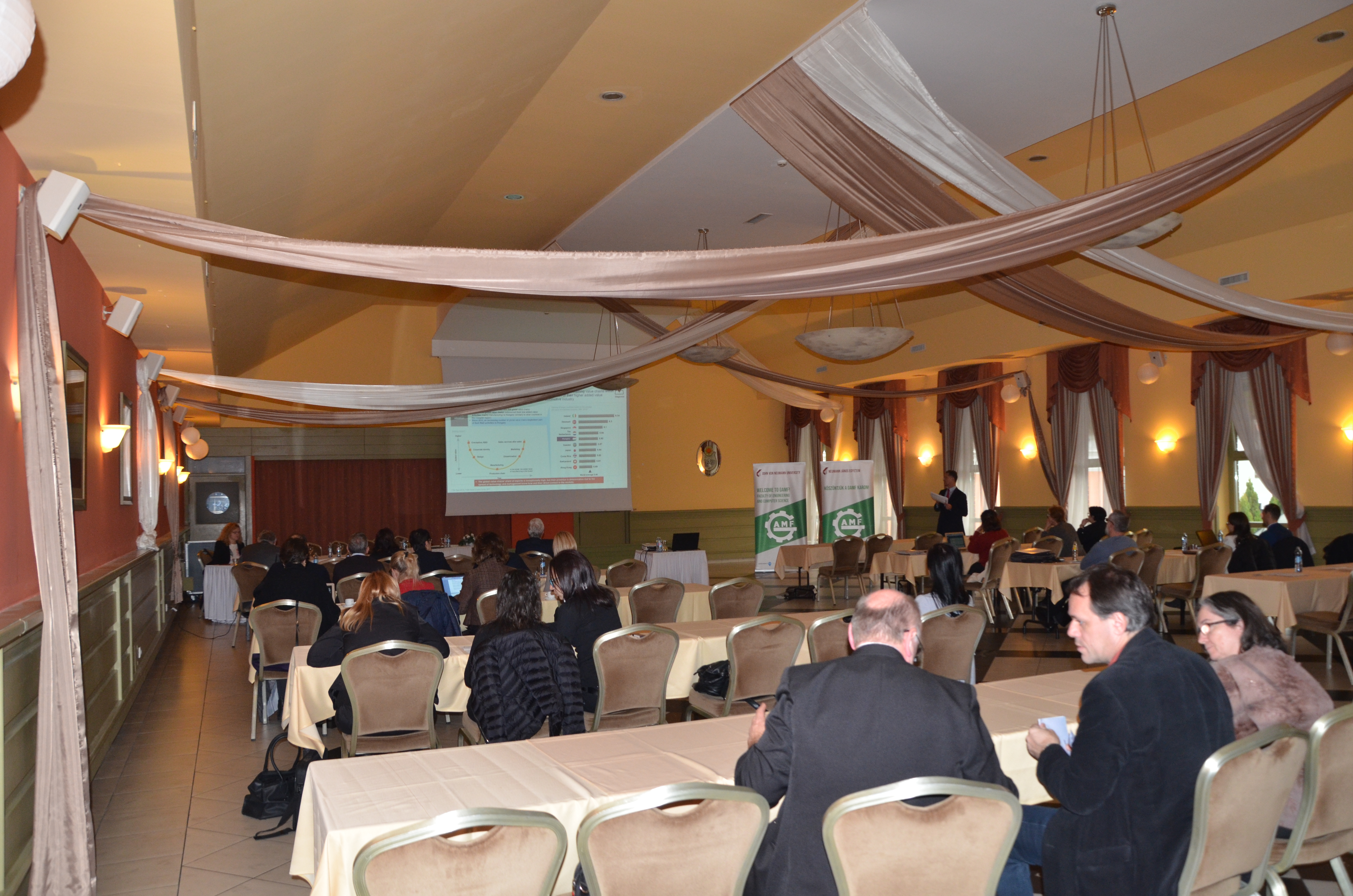EDU-LAB - International Conference on Dual Studies in Higher Education in Kecskemét
13-12-2018
The John von Neumann University in Kecskemét, partner of the project EDU-LAB, hosted an international conference on dual/cooperative studies in higher education on 4th December 2018. The conference was organised in the framework of the EFOP-3.5.1-16-2017-00008 "The development of dual and cooperative higher educational trainings, higher educational vocational and special trainings." project which aims to enhance the development of dual study programmes in higher education in Hungary.
Several project partners of EDU-LAB and their external stakeholders joined the conference as the topic of the event is closely connected to enhancing the labour market relevance of higher education as well. Further participants included representatives of the Hungarian Ministry of Innovation and Technology, the Hungarian Chamber of Commerce, educational and research institutes and businesses. Guests were welcomed by Dr. Piroska Ailer, Rector of John von Neumann University and József Gaál, Vice Mayor of the Municipality of Kecskemét.
 Speeches predominantly focused on acquainting participants with the methodology of dual study programmes in the Danube region, through examples from Slovakia and Hungary. First, Doc. Ing. Lubos Magdolen demonstrated how the first professionally oriented Bachelor’s programme in Slovakia is organised, which was introduced in August 2018 as part of the pilot activities within EDU-LAB. Regarding dual study programmes in Hungary, Prof. Dr. Károly Belina held a presentation on the structure of dual education at John von Neumann University in Kecskemét. The development of the “Kecskemét model” started in 2010 and is based on the systematic cooperation between universities and industry, combining academic education with corporate training. Dr. Belina emphasised the importance for companies to treat the students as students and not simple workers: they have to educate them. Eliza Angeli, Research Fellow at the John von Neumann University further introduced the audience into the concept of dual study programmes, by presenting the answers to a few imperative questions in detail regarding for instance target groups, indicators and risks of dual training
Speeches predominantly focused on acquainting participants with the methodology of dual study programmes in the Danube region, through examples from Slovakia and Hungary. First, Doc. Ing. Lubos Magdolen demonstrated how the first professionally oriented Bachelor’s programme in Slovakia is organised, which was introduced in August 2018 as part of the pilot activities within EDU-LAB. Regarding dual study programmes in Hungary, Prof. Dr. Károly Belina held a presentation on the structure of dual education at John von Neumann University in Kecskemét. The development of the “Kecskemét model” started in 2010 and is based on the systematic cooperation between universities and industry, combining academic education with corporate training. Dr. Belina emphasised the importance for companies to treat the students as students and not simple workers: they have to educate them. Eliza Angeli, Research Fellow at the John von Neumann University further introduced the audience into the concept of dual study programmes, by presenting the answers to a few imperative questions in detail regarding for instance target groups, indicators and risks of dual training
Attendees also got a glimpse into the perspective of business support organizations and industry partners taking part in dual study programmes, through the presentations of József Gaál from the Hungarian Chamber of Commerce and Industry and Szilva Varga-Papp, HR Manager at Knorr-Bremse. The main role of Chambers of Commerce and Industry is to organise the practical side of dual education, facilitate partnerships between partners as well as to monitor trends and statistics. Ms Szilvia Varga-Papp explained that Knorr-Bremse is engaged in dual study programmes as around 50% of jobs at the company require a degree in higher education. Knorr-Bremse has been a partner of John von Neumann University from the beginning of the introduction of dual study programmes in 2011 and students are contracted from the first day of their studies.
Dr. des. Ágnes Sebestyén, Project Director of EDU-LAB at the European Foundation for Education highlighted the value of transnational cooperation to close the gap between higher education offers and labour market demands. In her presentation about EDU-LAB, she mentioned for instance how the “Kecskemét model” could serve as inspiration for the introduction of the Slovak professional Bachelor’s programme. She added that as EDU-LAB aims to increase the labour market relevance of higher education, it could also contribute to transforming the brain drain that the Danube region deeply suffers from into brain circulation.
transnational cooperation to close the gap between higher education offers and labour market demands. In her presentation about EDU-LAB, she mentioned for instance how the “Kecskemét model” could serve as inspiration for the introduction of the Slovak professional Bachelor’s programme. She added that as EDU-LAB aims to increase the labour market relevance of higher education, it could also contribute to transforming the brain drain that the Danube region deeply suffers from into brain circulation.
From the policy-making side, Dr. László Stefán Deputy Head of Department at the Ministry of Innovation and Technology in Hungary talked about the challenges and the vision of the Ministry regarding innovation, entrepreneurship and education. For instance, the country aims to attract more research and development to the country to get closer to EU-average and include more people into adult education.
Finally, Dr. Erika Török Vice Dean at the John von Neumann University summarised the results dual education has reached so far as well as its strengths and weaknesses. Most dual study students at the university are enrolled in programmes in the fields of engineering and informatics. According to her, one of the main strengths of this type of education is the two-way transfer of knowledge between academia and industry, while one of the weaknesses is that students can acquire too specific knowledge, especially if they only complete their practice at one company.
